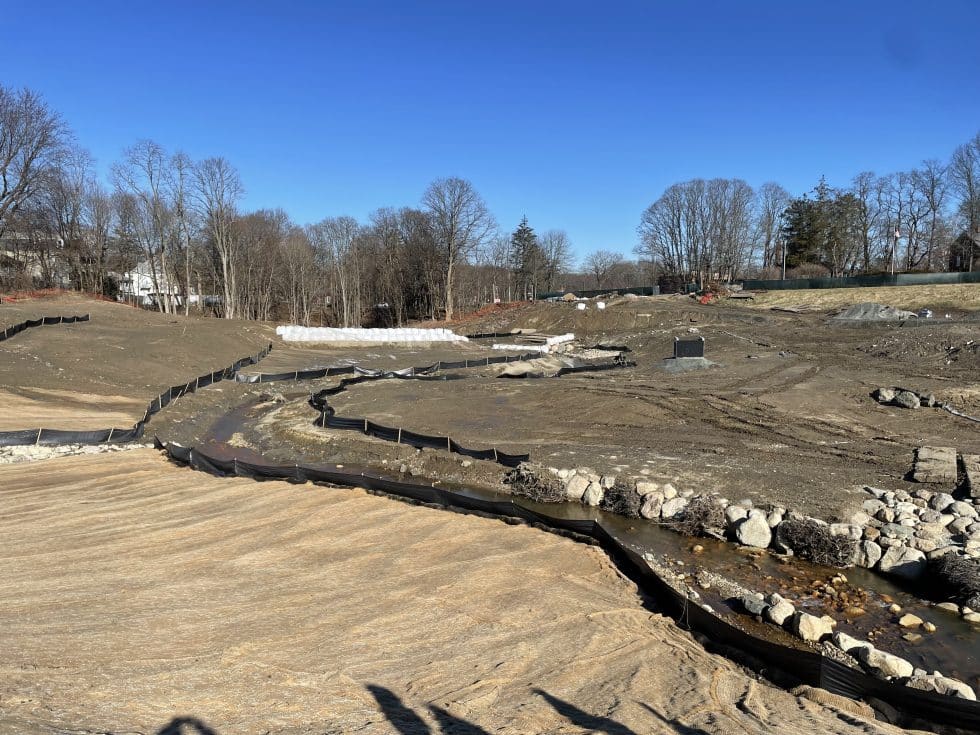Phase 1 of the Abbey Brook Revitalization and Restoration project is underway.
Reminder Publishing photo by Tyler Garnet
CHICOPEE — Chicopee has been working on a revitalization and restoration project at Abbey Brook for the last few years and Phase 2 of the project just received $100,000 to begin the design phase.
The Healey-Driscoll administration announced $2.1 million in grants to support 17 projects focused on restoring rivers and wetlands throughout Massachusetts.
These projects, funded by the Department of Fish and Game’s Division of Ecological Restoration, will help strengthen resilience to climate change, reduce flood risks, improve water quality and public safety, and restore wildlife habitat.
DER’s Priority Projects Program focuses on river and wetland restoration efforts.
These projects were selected through a competitive process and will provide significant ecological, social and economic benefits to the state. Specifically, they will remove aging, unsafe dams, restore former cranberry farms into healthy, resilient wetlands, replace undersized and degrading culverts with safer structures, and restore tidal flow to damaged coastal estuaries and salt marshes.
The funding for the Abbey Brook Restoration and Revitalization project will support design work for Phase 2, which will ultimately remove two dams, replace an undersized culvert, and “daylight” a 250-foot stretch of river that currently runs underground.
Abbey Brook is a small waterway that rises in Springfield and flows through Szot Park before emptying into the Chicopee River.
Abbey Brook’s flow through Szot Park is interrupted by two earthen dams, the Upper and Lower Bemis Pond dams, and have outlived their intended use and have begun to degrade and impact water quality.
The project will take place in three phases. The first phase is currently under construction with hopes of being done this summer. It includes the removal of one of the town-owned dams.
Planning Director Lee Pouliot explained that this phase will focus on the culvert replacement that needs to occur for the culvert that brings Abbey Brook under Front Street. The second scope will be to daylight the stream from Front Street to its confluence with the Chicopee River.
“There’s a second culvert after Front Street that the stream flows into that goes underneath a parking lot so we’re looking to restore that to a natural restored channel that then flows to the river,” Pouliot said.
This work will restore ecosystem health, improve water quality and stormwater management, and enhance public safety in an Environmental Justice community.
Once all three phases are complete, the project will reconnect 1.5 miles of Abbey Brook with the downstream Chicopee River, eliminating the risk to public safety posed by the aging dams, reducing flood risk, improving water quality and enhancing recreational opportunities for the community.
The final phase involves the removal of the Upper Bemis Pond dam and further restoration of the Abbey Brook.
Pouliot said DER has been with the city on this project since day one.
In 2018, the project was designated as a DER Provisional Priority Project with the intention of investigating the possibility of removing both dams and enhancing the Abbey Brook corridor.
Since then, they have added multiple awards toward construction and Pouliot added he is very appreciative of the grant program and help.
When talking about funding Chicopee continues to receive for this project, Pouliot said, “We have a very good relationship working in collaboration with the division of ecological restoration and the commonwealth particularly on this project and we’re really excited that we get to continue that into Phase 2.”
DFG Commissioner Tom O’Shea talked about the funding and how it can benefit the cities like Chicopee who received it.
He said, “As we face the intertwined crises of climate change and biodiversity loss, our partners across our state are stepping up to take action to protect our wildlife and way of life. We are proud to support these critical projects that will undoubtedly have a positive impact on biodiversity, which is the foundation for life in Massachusetts. With every river mile improved, culvert upgraded, and wetland restored, we secure clean water, protection from extreme weather, habitat for rare and imperiled species, and outdoor recreation opportunities.”



